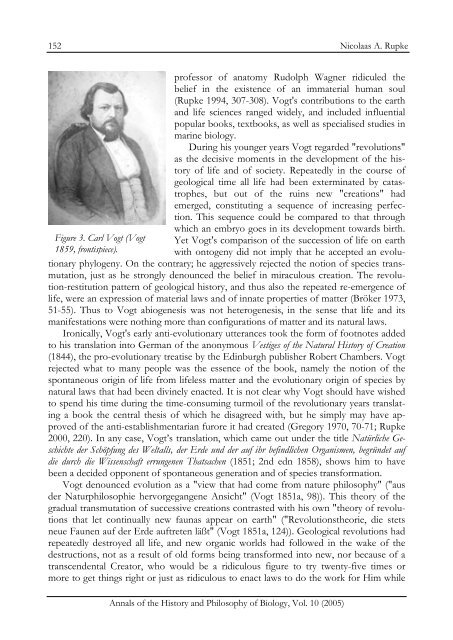Annals of the History and Philosophy of Biology
Annals of the History and Philosophy of Biology
Annals of the History and Philosophy of Biology
Create successful ePaper yourself
Turn your PDF publications into a flip-book with our unique Google optimized e-Paper software.
152<br />
Figure 3. Carl Vogt (Vogt<br />
1859,frontispiece).<br />
<strong>Annals</strong> <strong>of</strong> <strong>the</strong> <strong>History</strong> <strong>and</strong> <strong>Philosophy</strong> <strong>of</strong> <strong>Biology</strong>, Vol. 10 (2005)<br />
Nicolaas A. Rupke<br />
pr<strong>of</strong>essor <strong>of</strong> anatomy Rudolph Wagner ridiculed <strong>the</strong><br />
belief in <strong>the</strong> existence <strong>of</strong> an immaterial human soul<br />
(Rupke 1994, 307-308). Vogt's contributions to <strong>the</strong> earth<br />
<strong>and</strong> life sciences ranged widely, <strong>and</strong> included influential<br />
popular books, textbooks, as well as specialised studies in<br />
marine biology.<br />
During his younger years Vogt regarded "revolutions"<br />
as <strong>the</strong> decisive moments in <strong>the</strong> development <strong>of</strong> <strong>the</strong> history<br />
<strong>of</strong> life <strong>and</strong> <strong>of</strong> society. Repeatedly in <strong>the</strong> course <strong>of</strong><br />
geological time all life had been exterminated by catastrophes,<br />
but out <strong>of</strong> <strong>the</strong> ruins new "creations" had<br />
emerged, constituting a sequence <strong>of</strong> increasing perfection.<br />
This sequence could be compared to that through<br />
which an embryo goes in its development towards birth.<br />
Yet Vogt's comparison <strong>of</strong> <strong>the</strong> succession <strong>of</strong> life on earth<br />
with ontogeny did not imply that he accepted an evolu-<br />
tionary phylogeny. On <strong>the</strong> contrary; he aggressively rejected <strong>the</strong> notion <strong>of</strong> species transmutation,<br />
just as he strongly denounced <strong>the</strong> belief in miraculous creation. The revolution-restitution<br />
pattern <strong>of</strong> geological history, <strong>and</strong> thus also <strong>the</strong> repeated re-emergence <strong>of</strong><br />
life, were an expression <strong>of</strong> material laws <strong>and</strong> <strong>of</strong> innate properties <strong>of</strong> matter (Bröker 1973,<br />
51-55). Thus to Vogt abiogenesis was not heterogenesis, in <strong>the</strong> sense that life <strong>and</strong> its<br />
manifestations were nothing more than configurations <strong>of</strong> matter <strong>and</strong> its natural laws.<br />
Ironically, Vogt's early anti-evolutionary utterances took <strong>the</strong> form <strong>of</strong> footnotes added<br />
to his translation into German <strong>of</strong> <strong>the</strong> anonymous Vestiges <strong>of</strong> <strong>the</strong> Natural <strong>History</strong> <strong>of</strong> Creation<br />
(1844), <strong>the</strong> pro-evolutionary treatise by <strong>the</strong> Edinburgh publisher Robert Chambers. Vogt<br />
rejected what to many people was <strong>the</strong> essence <strong>of</strong> <strong>the</strong> book, namely <strong>the</strong> notion <strong>of</strong> <strong>the</strong><br />
spontaneous origin <strong>of</strong> life from lifeless matter <strong>and</strong> <strong>the</strong> evolutionary origin <strong>of</strong> species by<br />
natural laws that had been divinely enacted. It is not clear why Vogt should have wished<br />
to spend his time during <strong>the</strong> time-consuming turmoil <strong>of</strong> <strong>the</strong> revolutionary years translating<br />
a book <strong>the</strong> central <strong>the</strong>sis <strong>of</strong> which he disagreed with, but he simply may have approved<br />
<strong>of</strong> <strong>the</strong> anti-establishmentarian furore it had created (Gregory 1970, 70-71; Rupke<br />
2000, 220). In any case, Vogt’s translation, which came out under <strong>the</strong> title Natürliche Geschichte<br />
der Schöpfung des Weltalls, der Erde und der auf ihr befindlichen Organismen, begründet auf<br />
die durch die Wissenschaft errungenen Thatsachen (1851; 2nd edn 1858), shows him to have<br />
been a decided opponent <strong>of</strong> spontaneous generation <strong>and</strong> <strong>of</strong> species transformation.<br />
Vogt denounced evolution as a "view that had come from nature philosophy" ("aus<br />
der Naturphilosophie hervorgegangene Ansicht" (Vogt 1851a, 98)). This <strong>the</strong>ory <strong>of</strong> <strong>the</strong><br />
gradual transmutation <strong>of</strong> successive creations contrasted with his own "<strong>the</strong>ory <strong>of</strong> revolutions<br />
that let continually new faunas appear on earth" ("Revolutions<strong>the</strong>orie, die stets<br />
neue Faunen auf der Erde auftreten läßt" (Vogt 1851a, 124)). Geological revolutions had<br />
repeatedly destroyed all life, <strong>and</strong> new organic worlds had followed in <strong>the</strong> wake <strong>of</strong> <strong>the</strong><br />
destructions, not as a result <strong>of</strong> old forms being transformed into new, nor because <strong>of</strong> a<br />
transcendental Creator, who would be a ridiculous figure to try twenty-five times or<br />
more to get things right or just as ridiculous to enact laws to do <strong>the</strong> work for Him while

















